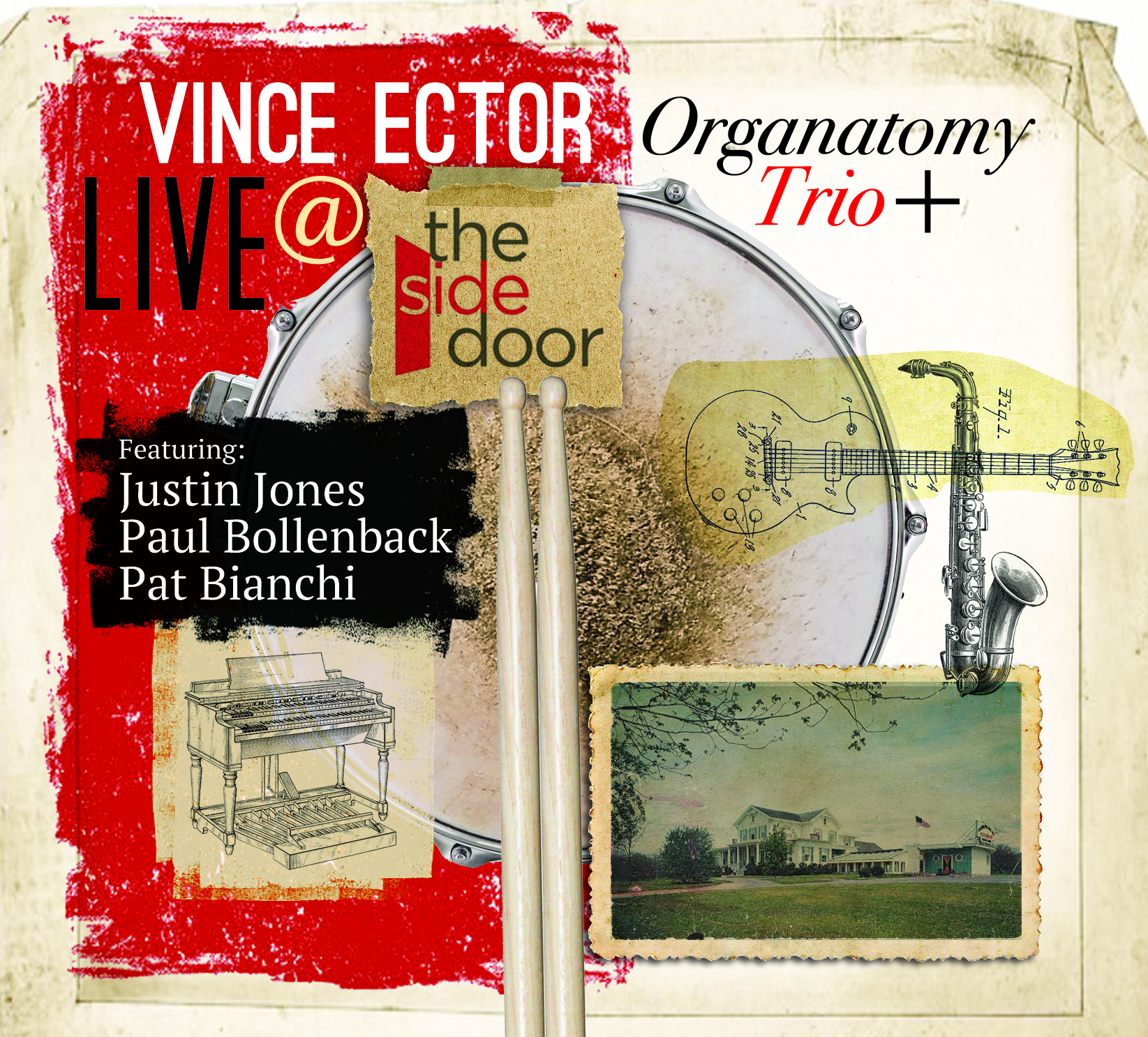Press
Philadelphia drummer Vince Ector has been working with versions of this Organatomy Trio for a while now, but this live date is terrific fun, and unique in a couple ways. First off, regular member Bruce Williams was sidelined, so Justin Jones on alto sax was a late sub, joining the drummer and guitarist Paul Bollenback and organist Pat Bianchi, but Jones fits in flawlessly.
Secondly, this show was recorded at The Side Door Jazz Club in Old Lyme, Connecticut, in 2020, just before the pandemic, by the club’s owner. With the enforced idleness that followed, Ector got a chance to hear the recording and realized the sound quality was superb, and the idea of releasing it as an album made perfect sense. No overdubs were needed, and this is just what that night’s audience heard. Ector’s own “South Philly Groove” is a nice introduction to this quartet’s unique sound, and the treatment of Benny Carter’s “The Courtship” is exquisite.
Bollenback shines on the fast-paced run through Dizzy Gillespie’s “Con Alma,” while Jones’ swinging melodicism makes “Love Won’t Let Me Wait” especially memorable. Bianchi’s organ serves two purposes, a foundation for most of the tunes, but also able to jump out front for his own sizzling solos. Ector’s own “Renewal Revisited” is a bold strut perfect for the dancefloor. For a delightful curveball, Burt Bacharach’s “Wives and Lovers” opens with a drum solo, before the three lead instruments do a beautiful unison reading of the melody, and then stretch out with individual solos.
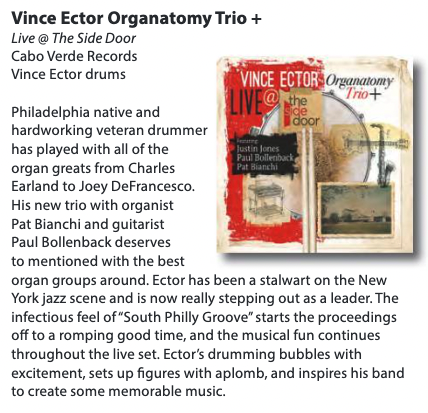
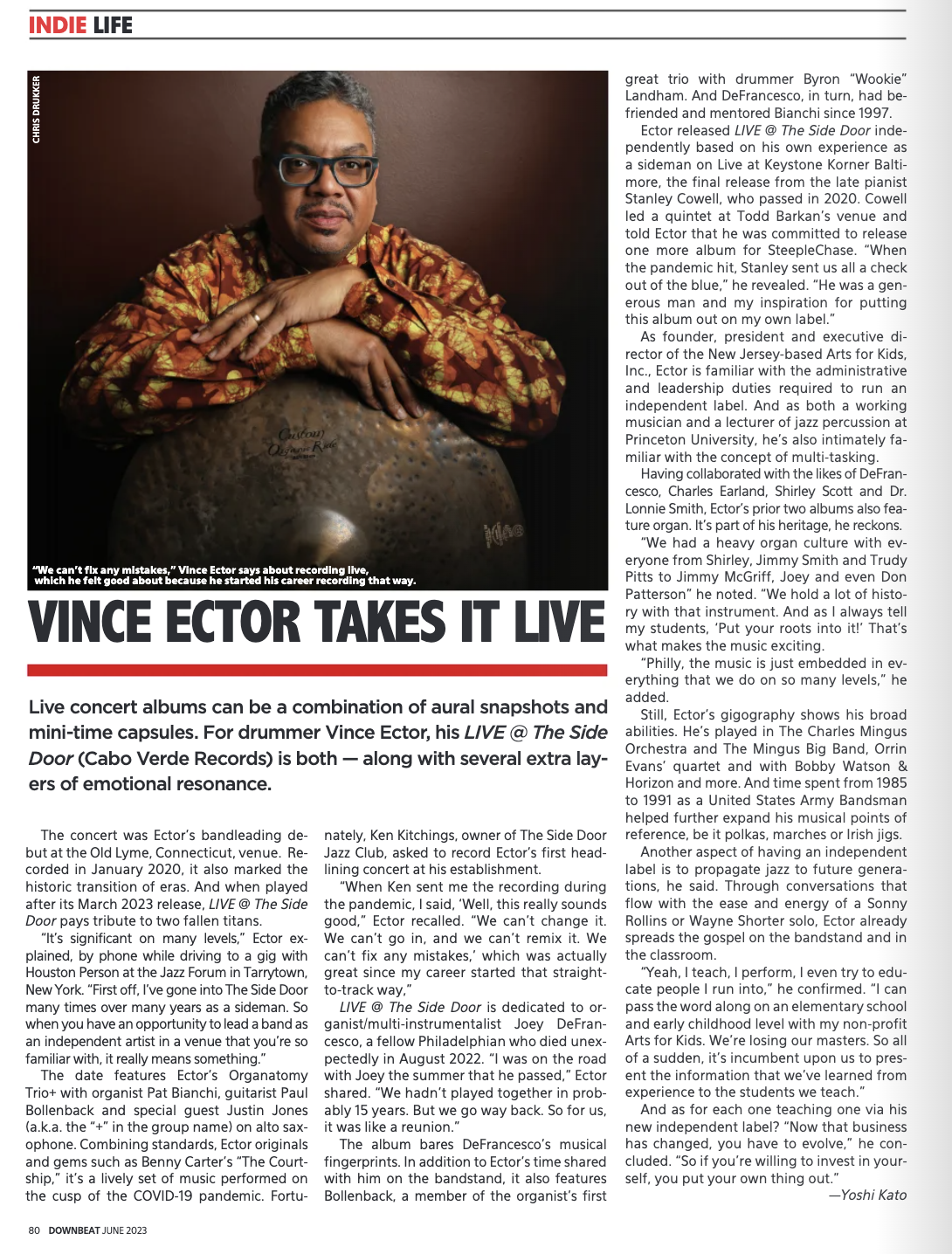
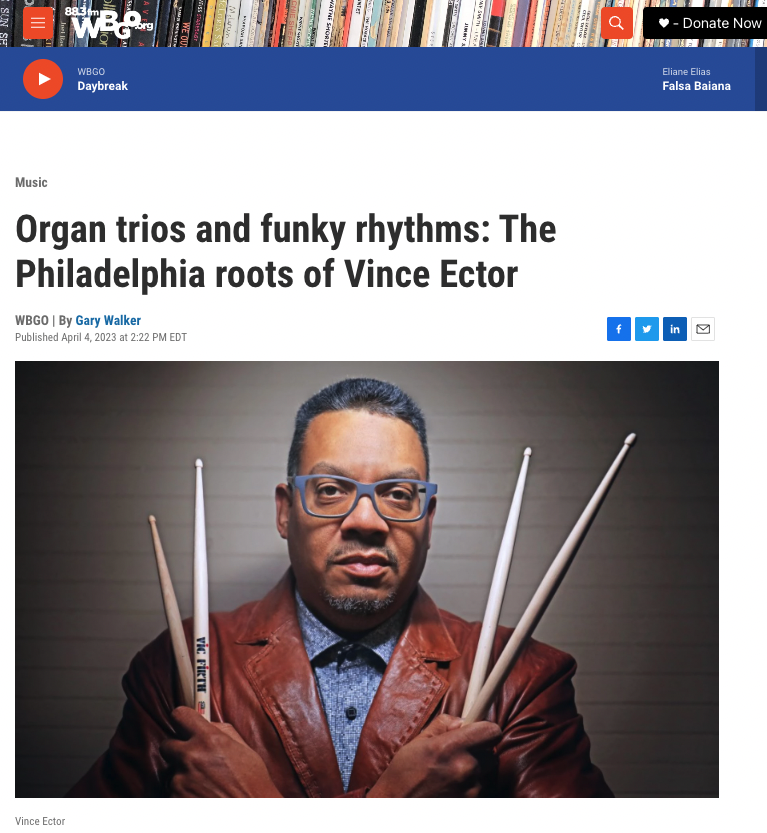
Organ trios and funky rhythms: The Philadelphia roots of Vince Ector
WBGO | By Gary Walker
Published April 4, 2023
He grew up in South Philadelphia where his father would take him to see organ great Don Patterson at Dino's. Drummer Vince Ector would study hard, and it paid off, with performances or recordings with Freddie Hubbard, Randy Weston, James Moody, Jimmy Heath and "The Mighty Burner," Charles Earland, among many others. Vince's new recording with The Organatomy Trio+, Live At The Side Door is a scorching live date, showing Vince's performance versatility. Recently he chatted with me about his career path, and his ongoing work with Arts for Kids.
Don’t sleep on this one. There's an Organatomy Trio+ release performance April 16 at SOPAC in South Orange, N.J.
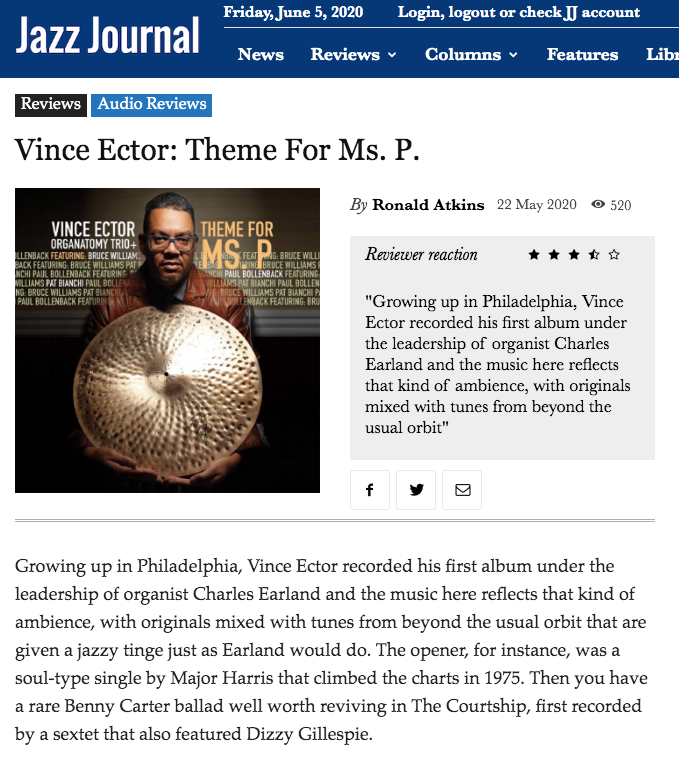 Vince Ector Organatomy Trio+ Theme for Ms P
Vince Ector Organatomy Trio+ Theme for Ms P
by Ronald Atkins
May 22, 2020
Jazz Journal
Growing up in Philadelphia, Vince Ector recorded his first album under the leadership of organist Charles Earland and the music here reflects that kind of ambience, with originals mixed with tunes from beyond the usual orbit that are given a jazzy tinge just as Earland would do. The opener, for instance, was a soul-type single by Major Harris that climbed the charts in 1975. Then you have a rare Benny Carter ballad well worth reviving in The Courtship, first recorded by a sextet that also featured Dizzy Gillespie.
Regarding the mix of organ and saxophone, one tends to visualise the latter as being a tenor. Not always the case, though, and Lou Donaldson, with whom Ector has played, would often pick an organist to back his alto solos.
Here we have Bruce Williams producing the right blend of invention and spirit, not least on Burt Bacharach’s Wives & Lovers where he ambles along engagingly in triple time. No surprise to find him switching to the soprano sax for The Courtship, a tune one could imagine attracting the likes of Grover Washington.
As mentioned in an earlier review, Pat Bianchi has abundant technique and admits the influence of Joey DeFrancesco. Both have a tendency towards rippling right-hand phrases, though in this context one cannot fault the way Bianchi fits into the overall pattern. A few tracks also include the excellent Paul Bollenback, further proof that Ector’s roots in organ-type jazz go back a long way.
Admirers of the genre should find plenty to enjoy.
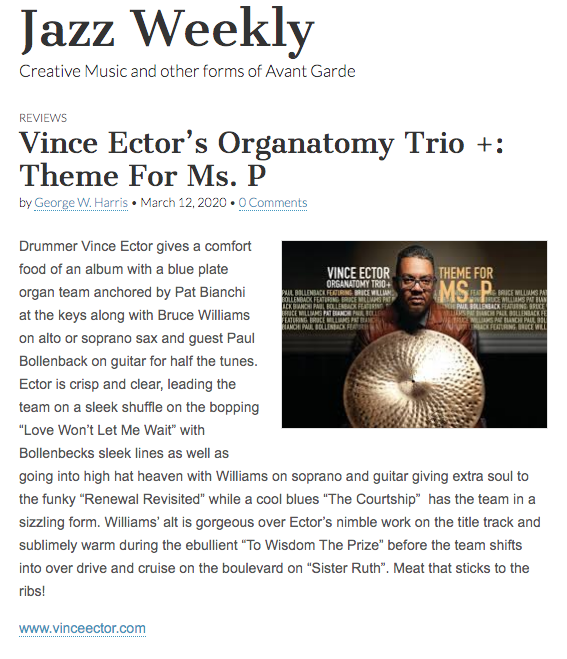 Vince Ector Organatomy Trio+ Theme for Ms P
Vince Ector Organatomy Trio+ Theme for Ms P
by George W. Harris
March 12, 2020
Jazz Weekly
Drummer Vince Ector gives a comfort food of an album with a blue plate organ team anchored by Pat Bianchi at the keys along with Bruce Williams on alto or soprano sax and guest Paul Bollenback on guitar for half the tunes. Ector is crisp and clear, leading the team on a sleek shuffle on the bopping "Love Won't Let Me Wait" with Bollenbecks sleek lines as well as going into high hat heaven with Williams on soprano and guitar giving extra soul to the funky "Renewal Revisited" while a cool blues "The Courtship" has the team in a sizzling form. Williams' alt is gorgeous over Ector's nimble work on the title track and sublimely warm during the ebullient "To Wisdom The Prize" before the team shifts into over drive and cruise on the boulevard on "Sister Ruth".
Meat that sticks to the ribs!
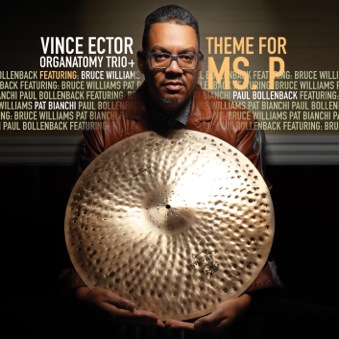 Vince Ector Organatomy Trio+ Theme for Ms P
Vince Ector Organatomy Trio+ Theme for Ms P
by Mike Hobart
Jazz Wise
Drummer and educator Vince Ector's fourth album as a leader introduces his Organatomy organ trio and revisits his Philadelphian past. The opening shuffle 'Don't Let Me Wait' was a hit for Major Harris, a founder member of the Philly Soul group The Delfonics, in 1975. And the swinging up-tempo closer covers Don Patterson's 'Sister Ruth', a memento of the gigs Ector's father took him to as a youth.
In between, a well- programmed balance of covers and originals namecheck musical influences and family ties. Benny Carter's 'The Courtship' hints at samba and rekindles memories of Ector's parents dancing at home and the moody 'To Wisdom the Prize' is dedicated to its composer, pianist Larry Willis, who died last year. Ector's well-worked originals are equally in style. 'Dex Blues', dedicated to his sister, is a mid-60s Blue Note blues in an awkward key; the up-tempo title track, dedicated to Ector's mother Ms Pat, switches from samba to swing and 'Renewal Revisited', first recorded with saxophonist Bobby Watson in 2008, features funky wah-wah guitar.
Ector has extensive credits in soulful mainstream jazz and his band captures the earthy intelligence of its lounge-bar roots. Long-standing member Bruce Williams is a ringer for Lou Donaldson on alto sax, soulful on soprano and spins lines with ease; while organist Pat Bianchi makes his Hammond B3 sing. And guesting on guitar, the experienced Paul Hollenbeck adds grit, muscle and panache. Solid album, nicely done.
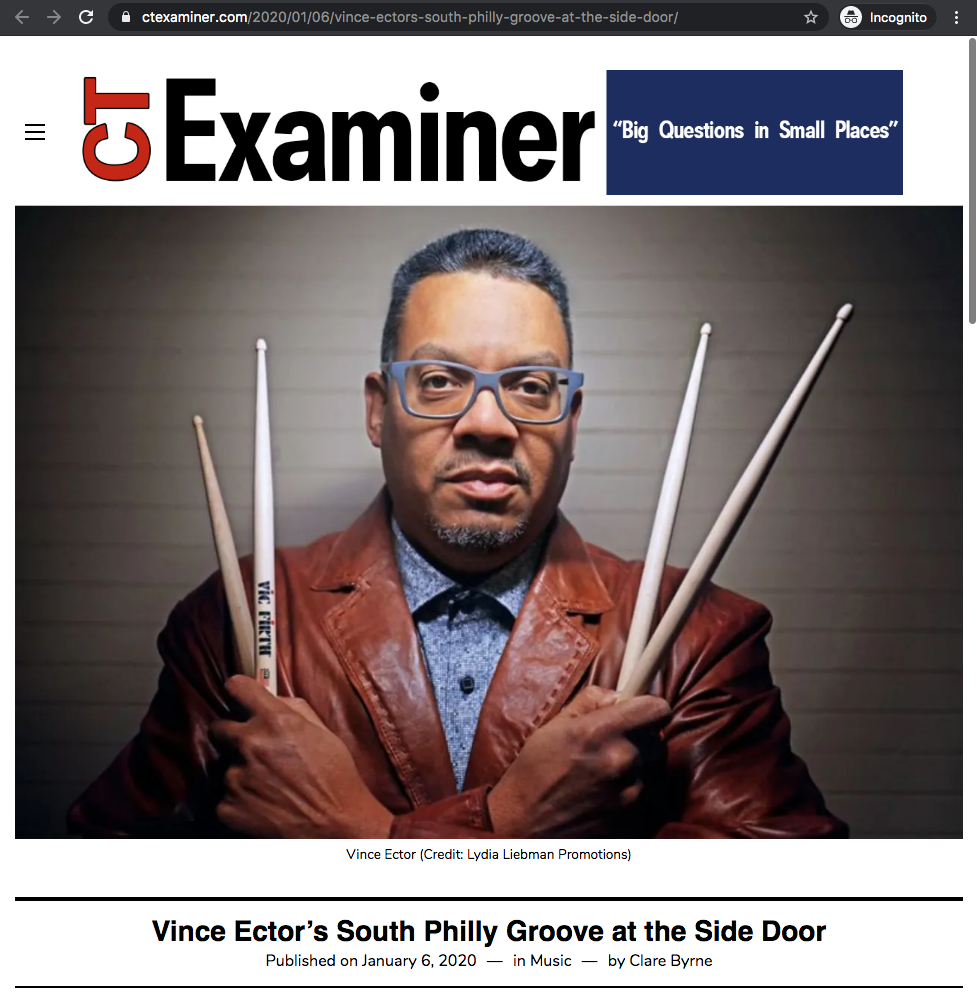 Vince Ector's South Philly Groove at the Side Door
Vince Ector's South Philly Groove at the Side Door
by Clare Byrne
January 6, 2020
ctexaminer.com
Philadelphia, land of the Schuykill River, home of the "South Philly Groove" as defined by Vince Ector, a dynamic jazz percussionist and leader of Organatomy Trio +, a quartet that rolled into the Side Door Jazz Club in Old Lyme on Friday night.
Ector was incredibly relaxed, dressed in an impeccable pink button-down shirt, introducing a song late in the second set by Burt Bacharach.
"See, people think that jazz musicians just like jazz. It's not true! I love pop music. We stole this song. Did all sorts of things to it -- we polluted it -- and now, here it is."
Ector and the band tore into a satisfyingly worked-over version of Bacharach's "Wives and Lovers", with Bianchi's organ solo questioning like a plaintive human voice, and Ector's understated final solo bringing complicated shadings to the pop.
Ector gives lots of space to his finely-calibrated collaborators. Pat Bianchi on Hammond organ, Paul Bollenback on electric guitar, and Justin Jones (replacing Bruce Williams) on saxophone, gave focused, nuanced performances on Friday night. We got to know each player, and each instrument, through luxurious sustained solos. But in the end, it was Ector's lush Philly-grooved sound, his compositions and commentary, that carried the music.
A Philadelphia native, Ector was educated through music magnet high schools in the city, and later at the University of Pennsylvania. He is a lecturer in Jazz Percussion at Princeton University,
"There's something in that Schuylkill water," Ector explained mid-set on Friday. "South Philly is where the Heath Brothers, Dizzy Gillespie, Charlie Biddle, Mickey Roker, John Coltrane – yes, John Coltrane -- came from... and Bobby Timmons, Lee Morgan, Shirley Scott." Along with Trudy Pitts, Scott helped popularize the Hammond organ for jazz.
Philadelphia is a place of confluence, where African Americans, German, Swedish, Dutch, Irish, Italian, German, and Jewish immigrants populated blocks. Religions rubbed elbows. Schoolkids rubbed elbows. Music rubbed elbows.
The jazz scene there played an underappreciated role in the emergence of bebop, with musicians traveling by train in the 1940s and 1950s between New York and Philadelphia. Later in the 1970s, jazz-radical Sun Ra and his Arkestra made Philadelphia his home, birthing a next generation of experimenters in free improvisation, cosmic solar thinking, and Africanist artistic imagination -- a movement still reverberating in pop, jazz, and fashion.
Ector's drumming is a wonder to listen to, and to watch. Sitting easily on his stool, his arm action is relaxed, precise, delicate. The angles and diagonals in his movements reminded this listener of diagrams of Hindu yantras -- exact, meaningful, and resonance-making.
His approach is a study in accumulation and invention. As audience, we watch him build a groove from the ground up. Here is a natural educator at work. We watch as he maintains the complicated set of rhythms he's accumulated, and then changes one thing. He might approach the cymbal from the underside, rather than the top, or switches the angle of his wrist, slightly, or from mallets to sticks. Or flips a stick to hear the same action from the other side. He hits on the rim of a snare rather than the skin. He plays with his elbows. All the while maintaining a 360-degree sonic groove. Once in the heart of his set I swear saw him play the air with his sticks -- it sounded really good.
That sound is sometimes deliciously jangly funky, and sometimes so smooth.
Ector covered great tunes in two substantial sets, including "Love Won't Let Me Wait" by Major Harris, "Con Alma" by Dizzy Gillespie, Larry Willis' "To Wisdom the Prize," and "Sister Ruth" by Don Patterson.
Bennie Carter's "The Courtship" on Friday night was a gorgeous melody played soulfully by Justin Jones on saxophone, then taken apart tenderly in solos by Bollenback on guitar and Bianchi on organ.
The evening included Ector's originals "Dex Blues," written about his sister, and "Renewal Revisited" a wacka-chaka jazz rock. Ector ended his second set with the title track "Theme for Ms. P," from his 2019 studio release with Organatomy +, written about his mother. As Ector introduced it, "This is not a love song, by the way. My mother said, if you are going to write a song for me, give it a beat! South Philly, here we go!"
 Jazz Album of the Week: Theme for Ms. P a Nostalgic Window into Vince Ector's Musical Coming of Age
Jazz Album of the Week: Theme for Ms. P a Nostalgic Window into Vince Ector's Musical Coming of Age
By MATT SILVER
July 15, 2019
WRTI/NPR
Drummer Vince Ector is a grown-up. He lives in New York City, the epicenter of unadulterated ambition. He teaches at Princeton, not really the type of place that evokes the inner child in us all. He plays with the Mingus Big Band and Orrin Evans's Captain Black Big Band, serious ensembles for the mature and sophisticated plier of one's craft.
But on Theme for Ms P., Ector's fourth album as a leader, the South Philadelphia native is wistful for times less serious, the days of his youth, when TSOP (The Sound of Philadelphia), that marriage of funk and soul that Philadelphia exported around the globe, was the most important thing in Ector's much smaller world.
Ector grew up playing funk and was introduced to jazz by his father, who would take him to Dino's Lounge in West Philly to hear the great Hammond organist, Don Patterson. It was at Dino's, listening to Patterson, that Ector would develop an approach to drumming with organ groups that has served his career very well. Having cut records with Charles Earland, Joey DeFrancesco, and now Pat Bianchi, Ector has made himself into a first-call drummer for the jazz world's best organ players.
But here, on Theme for Ms. P., it's Ector calling the tunes, and his Organatomy Trio +, with Bianchi (Hammond B-3 organ), Bruce Williams (alto and soprano sax), and organists' best friend, Paul Bollenback (guitar), helping Ector reconstruct the musical world of Ector's adolescence.
The opener, "Love Won't Let Me Wait," is the perfect leadoff tune for this kind of world restoration. A hit single for Major Harris in 1975, after he'd left the popular Philly soul group The Delfonics, Ector and the trio's version here is less velveteen couch and red silken cloth on the lampshade and more party-time swing.
Williams, on alto sax here, takes the melody and sprints out with it, handing off, in due course, to Bollenback for solo work, while Ector and Bianchi constitute a rhythm section of metronomic steadiness. We're still talking about love but probably less about the making of it and more about its universal application. Both are excellent, but for a red light special kind of moment, I'm sure Ector would agree: go with the original.
In the two-hole is "Dex Blues," an Ector original written for his sister, Linda Dexter. Ector prologues on drums, giving way to Bollenback and Williams who very hiply introduce the head of the tune in unison, which, in turn, begets Bianchi comping groovily for solos first by Bollenback, then by Williams. There's so much begetting here, this music is a nearly biblical experience. Meanwhile, Ector hangs back, presiding and keeping time, letting his bandmates shine, until about three-quarters of the way through when he smoothly interjects a minute-plus drum solo to facilitate a return to the tune's theme, reprised by Bollenback and Williams, who are simpatico throughout the album.
The cut I keep coming back to is the album's closer, Don Patterson's Sister Ruth, where, not surprisingly, Bianchi is given the widest berth to stretch out and show why he's the second most in-demand Hammond organist in the world, and Ector gives us his most aggressive send-up to former Patterson drummer, Billy James, whose playing he no doubt studied at Dino's Lounge all those years ago.
The title track, named for Ector's mother (Ms. Pat) who loved Horace Silver's work with Brazilian rhythms, is accordingly samba-tinged, while Burt Bacharach's "Wives and Lovers" is retrofitted to match the Organatomy Trio's energy and rhythmic sensibility, played up-tempo and in 6/8 time.
Not transcendent and not intergalactic, Theme for Ms. P affirms that the most populated plane of existence still has plenty to offer, including relaxed, nostalgic, ultra-competent jazz by some of the best doing it today.
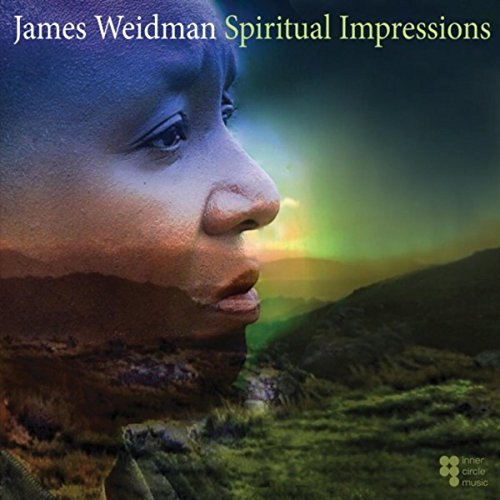 James Weidman: Spiritual Impressions
James Weidman: Spiritual Impressions
By JEROME WILSON
March 16, 2018
allaboutjazz.com
There is a long tradition of using traditional African-American spirituals as a basis for jazz explorations, but that is rarely done in one session with the breadth of approaches James Weidman uses on Spiritual Impressions. From the loping reggae beat on "Didn't My Lord Deliver Daniel" to the New Orleans rumba rhythm on "No Hiding Place," he and his excellent band always find a way to bring something new to these old songs.
The aforementioned "No Hiding Place" works up a wild party groove spurred on by Weidman's melodica and Anthony Nelson 's whirling tenor sax. In contrast "Nobody Knows" is a gentle ballad that has Nelson's fluid bass clarinet mixing with the easy elegance of Weidman's piano as Ruth Naomi Floyd's rich voice glides over all. "You Hear The Lamb A Cryin'" starts with wordless voice and flute over a somber, steady drum and bass beat. Then as Floyd begins singing the lyrics, the tempo slightly picks up and the flute begins to stretch out as the entire band shifts into a swinging mood.
The normally somber "Deep River" is played with a light, childlike touch that brings Nelson's flute back into the spotlight while "Wade In The Water" becomes a gritty piece of R & B carried by soprano sax and organ. "Joshua" throws some bubbling hip hop figures into the mix and Weidman's arrangement of "Let My People Go" recalls McCoy Tyner's 70s' music with its urgent African-flavored rhythm and elaborate, crashing piano chords. "African Spirals" is Weidman's one original composition, an instrumental that features a long, twisting piano solo, brawny, slow-boiling tenor sax and a relentless tribal rhythm laid down by Harvie S and Vince Ector.
All the elements of this music are outstanding, S and Ector's sympathetic rhythm flow, Nelson's bravura blasts on his various reeds, Weidman's subtly powerful and eloquent piano, and most especially Ruth Naomi Floyd's majestic voice which puts these old hymns over with quietly emotional conviction.
This is a jazz-gospel mix that tackles the spiritual genre in all sorts of ways, from gentle to funky and from celebratory to solemn. It's a really joyous and beautiful effort. Track Listing: Didn't My Lord Deliver Daniel; Deep River; No Hiding Place; Prelude To Freedom (Troubled Waters); Wade In The Water; Nobody Knows The Trouble I've Seen; Joshua Fit The Battle Of Jericho; You Hear The Lamb A Cryin'; African Spirals; Let My People Go; Walk Together, Children.
Personnel: James Weidman: piano, organ, melodica; Ruth Naomi Floyd: voice; Anthony Nelson: tenor, baritone & soprano saxophones, bass clarinet & flute; Harvie S: acoustic & electric bass; Vince Ector: drums.
Ector, a WO resident, to take OSPAC stage with daughter
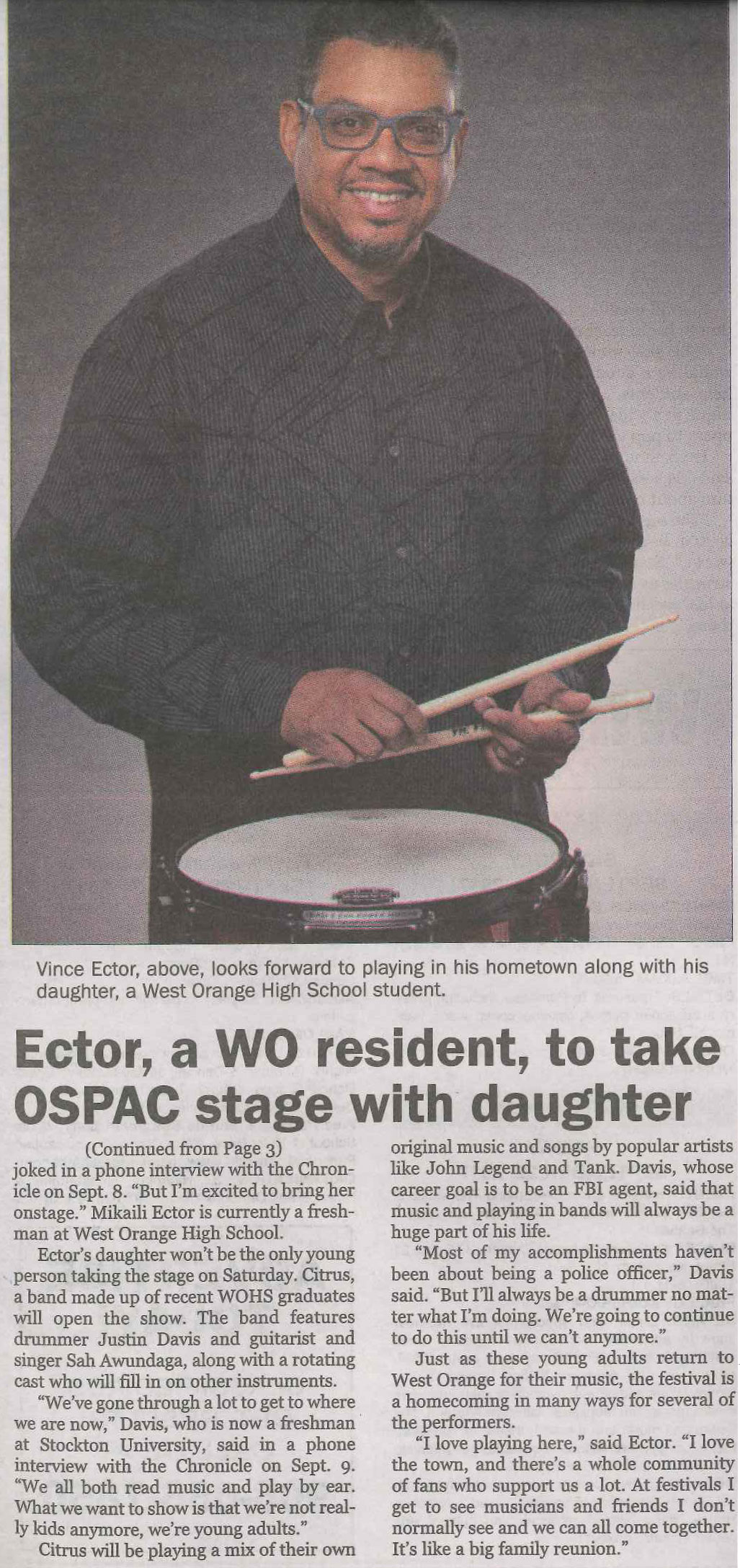
 Giacomo Gates, What Time Is It?
Giacomo Gates, What Time Is It?
Being a good jazz vocalist isn't easy, and simply releasing a CD doesn't prove competence. More than some genres, a voice that's technically good is almost a requirement. There are exceptions, but in this particular genre you don't find too many with an instrument like Leonard Cohen's. There's also the question of material. When it comes to the Great American Songbook, it's hard to give a fresh spin to tunes that were already popular in the first half of the 20th Century and never faded into obscurity. Usually the fault lies in the interpretations rather than the choices, with musicians creating uninspired arrangements of obvious material in a sad effort to seem relevant. Giacomo Gates avoids all of these pitfalls. He has a warm, intimate sound with the technical chops to do whatever he wants to with his voice and benefits from tasteful and uncluttered arrangements that allow him to draw in the listener with ingratiating humor, emotional insight, subtlety and exemplary musicianship. With John di Martino at the piano and Jerry Weldon's tenor sax out in front, the results never feel stilted and in fact Gates comes across as one of the most distinctive singers on the scene. His unique sense of phrasing and insinuating manner of delivering lyrics to songs like "On a Misty Night," "I Didn't Know What Time It Was," and "A Few Bucks Ahead" help assure him a place among today's top vocalists.
 Kristen Lee Sergeant, Inside Out (Whaling City Sound)
Kristen Lee Sergeant, Inside Out (Whaling City Sound)
On her 1993 album Blue Light 'Til Dawn, singer Cassandra Wilson expanded fans' perception of what a jazz standard could be, thanks to her adventurous interpretations of 1970s compositions by Joni Mitchell, Van Morrison and Ann Peebles. On Wilson's follow-up album, New Moon Daughter, she pushed the envelope further with a version of the Boyce & Hart composition "Last Train To Clarksville," a 1966 hit for The Monkees. On her debut album, Kristen Lee Sergeant takes a similar tack. The actress/singer, whose vocals can be buttery or deliciously tart, offers impressive renditions of songs from musical theater--including "Old Devil Moon" (1947) and the Rodgers & Hart compositions "I Wish I Were In Love Again" (1937) and "It Never Entered My Mind" (1940). Given Sergeant's background in theater, such selections seem natural. But the program also includes dramatically fresh arrangements of three hits that were in heavy rotation on MTV in the early '80s. Sergeant gracefully strides into the cabaret realm with "Everybody Wants To Rule The World." She injects some wordless scatting into the Tears For Fears hit, luxuriates in elongated vowel sounds and intertwines her punchy delivery with David Budway's intricate piano work. The Police hit "Every Breath You Take" has been reworked before--including a 2001 live version by Sting himself, featuring bassist Christian McBride and trumpeter Chris Botti--but here, Sergeant and Budway make it swing like a gate. Budway, who served as musical director for this album, relishes in shifting a song's tempo in order to create surprises.
The other musicians on the disc, bassist Chris Berger and drummer Vince Ector, are essential to the success of the most creative interpretation here: an engaging, slightly bizarre version of Modern English's "I Melt With You." The musicians transform it into a jazz tune, with jolts of arco riffs and diverse trap-set work that illustrates the drummer's range. But this arrangement also includes a section that veers into performance-art territory, featuring a spoken-word interlude peppered with potent alliteration. Sergeant puts her theatricality to superb use throughout the program, but does so with enhanced flair on this track. Inside Out is a solid debut from a classically trained vocalist whose journey into the jazz realm has already yielded gems; we hope to hear more in the future.
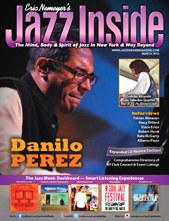 jazzinsidemagazine.com, March 2014
jazzinsidemagazine.com, March 2014Up One level
Pianist, composer, arranger Danilo Perez is featured in the March 2014 issue of Jazz Inside Magazine (print and digital). His new CD, Panama 500 is now available on Mack Avenue Records. In an interview with Marco Pignataro, Mr. Perez, who hails from Panama, discusses his work with Dizzy Gillespie, Wayne Shorter, his direction of the Berklee World Jazz Institute and more. This expanded 80-page issue of Jazz Inside Magazine also includes features interviews with pianist Fabian Almazan (Terence Blanchard), saxophonist Stacy Dillard, drummer Vince Ector and his organization Art For Kids; pianist Alberto Pizzo, bass is Robert Hurst, vocalist Kate McGarry, and trumpeter Mark Rapp, who discusses his new Into The Shed website, providing online lessons using leading edge technology. This issue also includes an expanded 20-page CD Review section, and a comprehensive calendar of hundreds of clubs, concert and event listings.
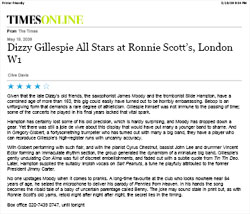 Times Online
Times Onlineby: Clive Davis
Dizzy Gillespie All Stars at Ronnie Scottís, London W1
"With Gisbert performing with such flair, and with the pianist Cyrus Chestnut, bassist John Lee and drummer Vincent Ector forming an immaculate rhythm section, the group generated the dynamism of a miniature big band."
Read More
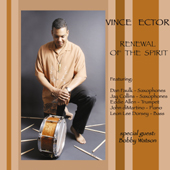 JazzTimes.com
JazzTimes.comby: Bill Milkowski
Drum Beat from the July/August 2006
VINCE ECTOR Renewal Of The Spirit
A reliably swinging sideman whose bandstand experience includes stints with Charles Earland, Freddie Hubbard, Grover Washington Jr. and Shirley Scott, Ector covers a variety of drumming styles on his second outing as a leader. With a dynamic frontline of underrated tenor saxophonist Jay Collins and trumpeter Eddie Allen alongside pianist John di Martino and bassist Leon Lee Dorsey, Ector steers a diverse course that runs the gamut from ballads to blues to bossa nova and hard bop. Special guest Bobby Watson lends his big-toned alto sax to two cuts here in Ector's Latin-flavored title track and a propulsive, freewheeling sax-drum encounter, "The Call."
While the drummer is clearly in the comfort zone when swinging, ably demonstrated on his Messengers-flavored "Melly's Blues" and his invigorating shuffle-swing number "Moving On," he stretches into some different territory on a sensitive reading of Jobim's pensive ballad Luizaî as well as on interpretations of Herbie Hancock's ethereal Butterflyî and Wayne Shorter's metrically shifting Night Dreamer." The Philly native showcases some of his most melodic playing on a brisk clave-fueled rendition of My Foolish Heart," then closes out his sophomore session with a spirited solo drum showcase, "For Our Fathers."
 Allaboutjazz.com
Allaboutjazz.comby: David A. Orthmann
February 2006
VINCE ECTOR Renewal Of The Spirit
During the course of Renewal Of The Spirit (Mambo Maniacs Records), Vince Ector's second recording as a leader, he forges a coherent, highly individualistic style of drumming from a number of disparate elements. One of the pleasures of listening to Ector on the disc's eleven tracks is discovering all of the things he brings to the music while working inside of the parameters of conventional jazz, funk, and Latin rhythms. His diverse sticking patterns, changes in dynamics, and contrasting timbres are pulled together by a fine sense of structure and organization. He also occasionally employs congas and various percussion instruments in novel ways, ranging from a few beats to several measures. Most importantly, Ector does all of these things in support of the music and never sets himself apart from the rest of the band.
Taken at a brisk tempo, "Rooftop," the disc's swinging opening track, is a good introduction to Ector's modus operandi. On the head of tenor saxophonist Jay Collins' composition, he's quite assertive. The snare, tom-toms, and bass drum produce a hard, unyielding, metallic sound. At the onset of Collins' solo, Ector does an about face, and the dry ping of the ride cymbal becomes the most prominent part of his drum kit. Throughout Collins' three choruses and two by pianist John diMartino, he's an accompanist rather than an interactive force. Without ever really calling any attention to his drumming, Ector introduces something new and different on nearly every chorus. Aside from some unobtrusive snare and bass drum comping, he varies the emphasis of the ride cymbal, plays a riff-like pattern on the bass drum in conjunction with a series of light cymbal crashes, works some bracing snare drum accents around diMartino's jabbing chords and, for several bars, strikes a neat balance between the cymbal, hi-hat on beats two and four, and the solid click of a rim knock on beat four.
A piano, bass, and drums trio interprets Antonio Carlos Jobim's "Luiza" as a pensive ballad in æ time. Playing mostly simple quarter and eighth note rhythms at a low volume, Ector is expressive in a patient way, creating a firm yet restrained pulse, and providing color by using sticks, brushes and mallets. His execution is flawless. Beginning with light strokes to a cymbal on the first beat of every measure, each of which sounds a little different, he slowly builds as the sections of the song unfold. In the early stages, Ector's strokes are often more felt than heard, and at times his volume is so low that it's difficult to tell whether he's using sticks or brushes. In support of diMartino's interpretation of the melody and solo he frequently employs rim knocks on all three beats. Ector also keeps adding little touches that make a differenceólike lightly scraping a brush across the drum head; using the hi-hat pedal to make a smart snap or a light swoosh; or tapping the bass drum in a familiar pattern during bassist Leon Lee Dorsey's bowed solo.
Ector's invigorating shuffle beat is the heart and soul of a performance of his composition "Moving On." During an eight measure introduction consisting of a repeated two-bar vamp played by diMartino and Dorsey, he sets the pace by emphasizing a few elements: Resounding cymbal crashes placed on downbeats; a crackling, repetitious shuffle pattern applied to the snare; and a similar pattern on the bass drum played at a lower volume so that it sounds like an echo of the snare. Both disciplined and outgoing, his drums and cymbals really make the band jump. Throughout the twice repeated fourteen bar head, while Dan Faulk plays the melody, Ector continues with the snare pattern, puts more emphasis on the ride cymbal, and adds stout fills to the snare and toms that briefly offset the shuffle's rigid design. He strays even further during the second chorus of Faulk's solo. Sensing that the tenor saxophonist is about to reach a climax, Ector obsessively hammers eighth note triplets with both sticks, then makes irregular, sputtering hits to the bass drum and cymbal. The effect is electrifying, temporarily ratcheting up the band's energy level before Ector resumes the shuffle.
Ector plays only the cymbals for nearly the entire first chorus of diMartino's solo on the pianist's "Remembrance." His playing walks a fine line between support of diMartino and a semi-autonomous rhythmic line. He doesn't continuously ride one cymbal, yet there's genuine momentum and continuity in his playing. He stays at a fairly low dynamic level throughout, so his rhythms never really stand out. Just when you begin to perceive a specific pattern, Ector is on to something else. Occasionally he'll play a complete, recognizable phrase, but doesn't immediately repeat or build on it. Instead there's an element of familiarity in the way he offers pieces of a few patterns in different places at various times. Ector strikes the cymbals in many ways, including hitting two at the same time, or making 3 or 4 stroke combinations with two sticks. He also utilizes the hi-hat pedal to get a terse, chomping sound and a thickset crash. In a different way than "Moving On," it's a highly disciplined performance that never detracts from the evolution of diMartino's solo.
Aside from his timekeeping and accompaniment, Ector plays several solos on the record as well. Displaying excellent sticking technique and a logical progression of ideas, his twenty-four bar break on "Melly's Blues" is one long burst of agitated movement. Devoid of a steady ride cymbal or constant bass drum, he nonetheless moves the solo along in a continuous, linear fashion. His drums sound large and imposing, yet there's never any dead weight. The snare drum is the focal point, and the dense, persistent bunches of strokes are broken up by brief jabbing forays to the tom toms.
Unlike the highly disciplined shuffle that drives the band for most of the track, Ector's sixty-bar "Moving On" solo is skittish and wildly imaginative. For the most part he plays forceful brush strokes over diMartino's rock hard vamp. Sometimes he's tethered to the vamp; in other instances he flies in the face of it. Ector explores every nook and cranny of the phrase, approaching it from any number of angles. He jams dozens of rowdily flapping strokes into a few bars, or simply makes a few select hits. An anti-climactic ending consists of Ector steadily rubbing the brush across the drum head at a volume way below diMartino's piano.
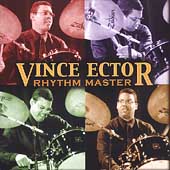 Jazztimes
JazztimesDrum Beat by: Bill Milkowski
November 2004
VINCE ECTOR Rhythm Master (Blues Leaf)
As a longtime sideman to the late Hammond B3 organ great Charles Earland, Philadelphia native Vince Ector knows a thing or two about shuffles, uptempo swingers and funk grooves. But he reveals far more sides of his musical makeup than that on his debut as a leader, Rhythm Master (Blues Leaf). While the opening shuffle-swing of "South Philly Groove" is to be expected of someone who spent so much time with the Mighty Burner, what surprises and delights here is Ector's marvelous brushwork-brisk and virtuosic on Dizzy Gillespie's "Groovin' High," relaxed and alluring on "What's New." Elsewhere, the drummer-bandleader turns in a fresh 3/4 reading of "I've Got the World on a String," tackles a Puerto Rican bomba groove on pianist John DiMartino's "Iberian Echoes," then doubles on drums and djembe to work up a hypnotic 6/8 Congolese groove on the title track. And for sheer uptempo sizzle Ector scores big points with his rendition of Kenny Dorham's "Short Story," featuring some magnificent trumpet work by special guest Eddie Henderson.
 AllAboutJazz.com
AllAboutJazz.comby: David A. Orthmann
November 2003
VINCE ECTOR Rhythm Master (Blues Leaf)
Energized by a core trio with bassist Dwayne Burno and pianist John di Martino, drummer Vince Ector's debut displays the loose, enjoyable feeling of a hard bop blowing session, yet the scope of the material and arrangements indicate a great deal of thought and preparation. Inventively utilizing a number of combinations of trombone, tenor and soprano saxophones, flute, trumpet, guitar, and percussion, the set includes American popular songs (eg. "I've Got The World On A String"), jazz standards (eg. "Short Story"), and a few originals. The relative brevity of individual tracks (only three of nine are over seven minutes) discourages any excess or self-indulgence, and all of the soloists make the most of their limited time in the spotlight.
Ector is an ingenious musician who demonstrates numerous ways of orchestrating the band's momentum. The opening cut, his composition "South Philly Groove," is a brisk shuffle that crackles with the drummer's energy and resourcefulness. Without breaking the continuity established by the static but swinging rhythmic pattern, he galvanizes the head by hammering eighth-note triplet fills to the tom-toms, and adds other brief asides. Ector lays back for the first couple of choruses of Bob Ferrel's solo, then jumps in during a pause and sends the band into orbit by mimicking the trombonist's phrases on the snare and cymbals.
On "Groovin High," Ector mobilizes the trio by moving from brushes to sticks and back to brushes, displaying a similar approach to both implements. As di Martino states Dizzy Gillespie's theme, the decisive snap of the bushes predominates; and muffled, run-on bass drum accents and the occasional soft sizzle of the crash cymbal round out the sound of the drum set. During the first chorus of the pianist's solo, Ector's strokes turn brusque, offering a hectic counterpoint to di Martino's bebop-oriented lines. For the second chorus, he switches to sticks, and this time the broad, constant hiss of a ride cymbal stands out, pushing the bass and piano in an unwavering, linear way. Back to the brushes for Burno's turn, he's both lower in volume and a bit smoother then before. Then, as a prologue to an extended drum solo, Ector exchanges eights with di Martino. His weighty, exaggerated hits to the bass drum make for explosive punctuation, shaking up phrases and making the brushes sound almost wispy in comparison.
These kinds of fireworks are nowhere to be found on the classic ballad "What's New." Delineating the pulse by gently pressing the hi-hat pedal on 2 and 4, Ector mostly concentrates on creating texture and color. The smooth sweep of his brushes make a fine match for the breathy tone of Craig Bailey's flute. When Bailey and trombonist Avi Liebovich take turns playing the melody, the drummer intermittently rakes a brush against the cymbal in unison with di Martino's chords. Moreover, he further enhances the music by using mallets in a variety of ways. Carefully executed rolls to the drums at the beginning of the track evoke the rumble of a rapidly approaching thunderstorm. He builds a crescendo on the cymbal that serves as a bridge between Bailey and Liebovich's portions of the melody. And, towards the end of Bailey's solo, Ector's clopping tom-tom strokes momentarily draw attention away from the music's reflective disposition.
| Star Ledger Drummer on a Roll by: Zan Stewart Versatile bandleader also fulfill dream of bringing music and art to school children... read all » |
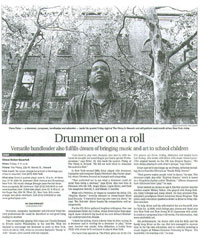 |

